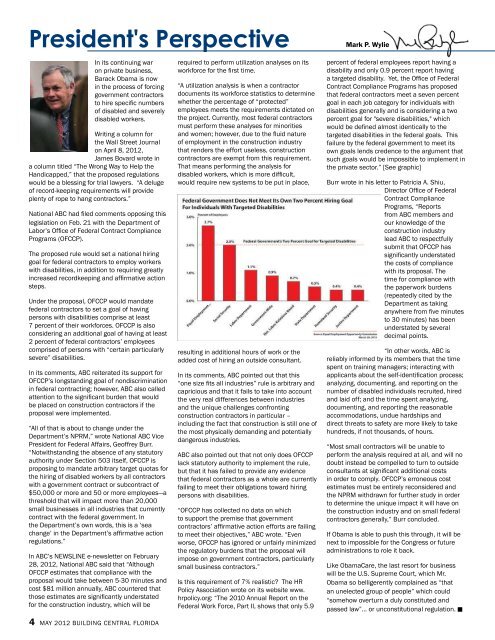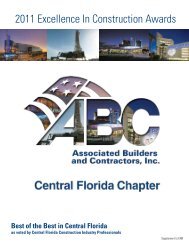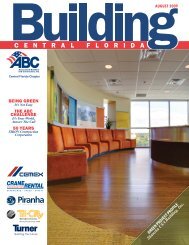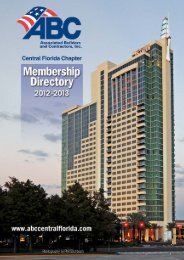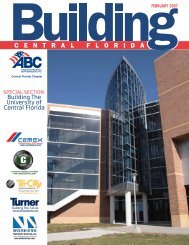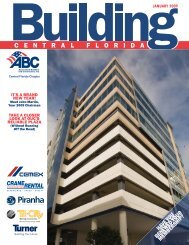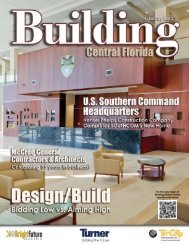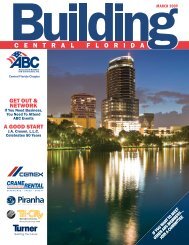professional shoring & supply professional shoring & supply
professional shoring & supply professional shoring & supply
professional shoring & supply professional shoring & supply
Create successful ePaper yourself
Turn your PDF publications into a flip-book with our unique Google optimized e-Paper software.
President's Perspective<br />
In its continuing war<br />
on private business,<br />
Barack Obama is now<br />
in the process of forcing<br />
government contractors<br />
to hire specific numbers<br />
of disabled and severely<br />
disabled workers.<br />
Writing a column for<br />
the Wall Street Journal<br />
on April 8, 2012,<br />
James Bovard wrote in<br />
a column titled “The Wrong Way to Help the<br />
Handicapped,” that the proposed regulations<br />
would be a blessing for trial lawyers. “A deluge<br />
of record-keeping requirements will provide<br />
plenty of rope to hang contractors.”<br />
National ABC had filed comments opposing this<br />
legislation on Feb. 21 with the Department of<br />
Labor’s Office of Federal Contract Compliance<br />
Programs (OFCCP).<br />
The proposed rule would set a national hiring<br />
goal for federal contractors to employ workers<br />
with disabilities, in addition to requiring greatly<br />
increased recordkeeping and affirmative action<br />
steps.<br />
Under the proposal, OFCCP would mandate<br />
federal contractors to set a goal of having<br />
persons with disabilities comprise at least<br />
7 percent of their workforces. OFCCP is also<br />
considering an additional goal of having at least<br />
2 percent of federal contractors’ employees<br />
comprised of persons with “certain particularly<br />
severe” disabilities.<br />
In its comments, ABC reiterated its support for<br />
OFCCP’s longstanding goal of nondiscrimination<br />
in federal contracting; however, ABC also called<br />
attention to the significant burden that would<br />
be placed on construction contractors if the<br />
proposal were implemented.<br />
“All of that is about to change under the<br />
Department’s NPRM,” wrote National ABC Vice<br />
President for Federal Affairs, Geoffrey Burr.<br />
“Notwithstanding the absence of any statutory<br />
authority under Section 503 itself, OFCCP is<br />
proposing to mandate arbitrary target quotas for<br />
the hiring of disabled workers by all contractors<br />
with a government contract or subcontract of<br />
$50,000 or more and 50 or more employees—a<br />
threshold that will impact more than 20,000<br />
small businesses in all industries that currently<br />
contract with the federal government. In<br />
the Department’s own words, this is a ‘sea<br />
change’ in the Department’s affirmative action<br />
regulations.”<br />
In ABC’s NEWSLINE e-newsletter on February<br />
28, 2012, National ABC said that “Although<br />
OFCCP estimates that compliance with the<br />
proposal would take between 5-30 minutes and<br />
cost $81 million annually, ABC countered that<br />
those estimates are significantly understated<br />
for the construction industry, which will be<br />
4 MAY 2012 BUILDING CENTRAL FLORIDA<br />
required to perform utilization analyses on its<br />
workforce for the first time.<br />
“A utilization analysis is when a contractor<br />
documents its workforce statistics to determine<br />
whether the percentage of “protected”<br />
employees meets the requirements dictated on<br />
the project. Currently, most federal contractors<br />
must perform these analyses for minorities<br />
and women; however, due to the fluid nature<br />
of employment in the construction industry<br />
that renders the effort useless, construction<br />
contractors are exempt from this requirement.<br />
That means performing the analysis for<br />
disabled workers, which is more difficult,<br />
would require new systems to be put in place,<br />
resulting in additional hours of work or the<br />
added cost of hiring an outside consultant.<br />
In its comments, ABC pointed out that this<br />
“one size fits all industries” rule is arbitrary and<br />
capricious and that it fails to take into account<br />
the very real differences between industries<br />
and the unique challenges confronting<br />
construction contractors in particular –<br />
including the fact that construction is still one of<br />
the most physically demanding and potentially<br />
dangerous industries.<br />
ABC also pointed out that not only does OFCCP<br />
lack statutory authority to implement the rule,<br />
but that it has failed to provide any evidence<br />
that federal contractors as a whole are currently<br />
failing to meet their obligations toward hiring<br />
persons with disabilities.<br />
“OFCCP has collected no data on which<br />
to support the premise that government<br />
contractors’ affirmative action efforts are failing<br />
to meet their objectives,” ABC wrote. “Even<br />
worse, OFCCP has ignored or unfairly minimized<br />
the regulatory burdens that the proposal will<br />
impose on government contractors, particularly<br />
small business contractors.”<br />
Is this requirement of 7% realistic? The HR<br />
Policy Association wrote on its website www.<br />
hrpolicy.org: “The 2010 Annual Report on the<br />
Federal Work Force, Part II, shows that only 5.9<br />
Mark P. Wylie<br />
percent of federal employees report having a<br />
disability and only 0.9 percent report having<br />
a targeted disability. Yet, the Office of Federal<br />
Contract Compliance Programs has proposed<br />
that federal contractors meet a seven percent<br />
goal in each job category for individuals with<br />
disabilities generally and is considering a two<br />
percent goal for "severe disabilities," which<br />
would be defined almost identically to the<br />
targeted disabilities in the federal goals. This<br />
failure by the federal government to meet its<br />
own goals lends credence to the argument that<br />
such goals would be impossible to implement in<br />
the private sector.” [See graphic]<br />
Burr wrote in his letter to Patricia A. Shiu,<br />
Director Office of Federal<br />
Contract Compliance<br />
Programs, “Reports<br />
from ABC members and<br />
our knowledge of the<br />
construction industry<br />
lead ABC to respectfully<br />
submit that OFCCP has<br />
significantly understated<br />
the costs of compliance<br />
with its proposal. The<br />
time for compliance with<br />
the paperwork burdens<br />
(repeatedly cited by the<br />
Department as taking<br />
anywhere from five minutes<br />
to 30 minutes) has been<br />
understated by several<br />
decimal points.<br />
“In other words, ABC is<br />
reliably informed by its members that the time<br />
spent on training managers; interacting with<br />
applicants about the self-identification process;<br />
analyzing, documenting, and reporting on the<br />
number of disabled individuals recruited, hired<br />
and laid off; and the time spent analyzing,<br />
documenting, and reporting the reasonable<br />
accommodations, undue hardships and<br />
direct threats to safety are more likely to take<br />
hundreds, if not thousands, of hours.<br />
“Most small contractors will be unable to<br />
perform the analysis required at all, and will no<br />
doubt instead be compelled to turn to outside<br />
consultants at significant additional costs<br />
in order to comply. OFCCP’s erroneous cost<br />
estimates must be entirely reconsidered and<br />
the NPRM withdrawn for further study in order<br />
to determine the unique impact it will have on<br />
the construction industry and on small federal<br />
contractors generally,” Burr concluded.<br />
If Obama is able to push this through, it will be<br />
next to impossible for the Congress or future<br />
administrations to role it back.<br />
Like ObamaCare, the last resort for business<br />
will be the U.S. Supreme Court, which Mr.<br />
Obama so belligerently complained as “that<br />
an unelected group of people” which could<br />
“somehow overturn a duly constituted and<br />
passed law”… or unconstitutional regulation.<br />
PROFESSIONAL<br />
SHORING & SUPPLY<br />
steel trench shield<br />
ORLANDO OFFICE<br />
11128 Boggy Creek Rd<br />
Orlando, FL 32824<br />
Office: 407-854-9949<br />
Fax: 407-854-9917<br />
p<br />
s<br />
s<br />
slide rail system<br />
YOUR COMPLETE RENTAL RESOURCE<br />
p<br />
s<br />
s<br />
quicksheet guideframe<br />
manhole shield<br />
stone mizer ®<br />
xlap aluminum shield build-a-box modular hydraulic vertical shores<br />
pipe plugs pipe lasers<br />
gas monitors<br />
MAY 2012 BUILDING CENTRAL FLORIDA 5


